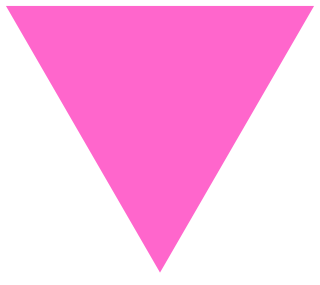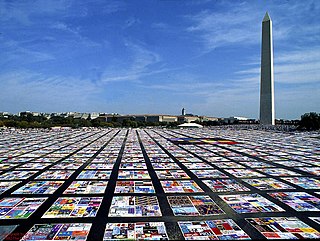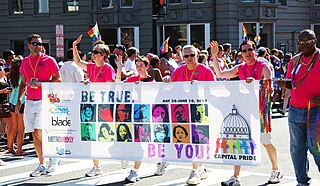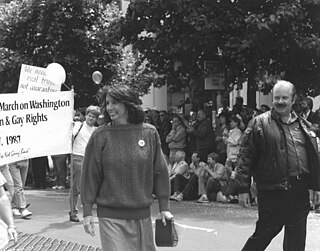Related Research Articles

A pink triangle has been a symbol for the LGBT community, initially intended as a badge of shame, but later reclaimed as a positive symbol of self-identity. In Nazi Germany in the 1930s and 1940s, it began as one of the Nazi concentration camp badges, distinguishing those imprisoned because they had been identified by authorities as gay men. In the 1970s, it was revived as a symbol of protest against homophobia, and has since been adopted by the larger LGBT community as a popular symbol of LGBT pride and the LGBT movements and queer liberation movements.

The NAMES Project AIDS Memorial Quilt, often abbreviated to AIDS Memorial Quilt or AIDS Quilt, is a memorial to celebrate the lives of people who have died of AIDS-related causes. Weighing an estimated 54 tons, it is the largest piece of community folk art in the world as of 2020. It was conceived in 1985, during the early years of the AIDS pandemic, when social stigma prevented many AIDS victims from receiving funerals. It has been displayed on the Mall in Washington, D.C., several times. In 2020, it returned to San Francisco, where it is now cared for by the National AIDS Memorial. It can be seen virtually.
The Sisters of Perpetual Indulgence (SPI), also called Order of Perpetual Indulgence (OPI), is a charitable, protest, and street performance movement that uses drag and religious imagery to satirize issues of sex, gender, and morality and fundraise for charity. In 1979, a small group of gay men in San Francisco began wearing the attire of Catholic nuns in visible situations using camp to promote various social and political causes in the Castro District.

LGBT culture is a culture shared by lesbian, gay, bisexual, transgender, and queer individuals. It is sometimes referred to as queer culture, while the term gay culture may be used to mean either "LGBT culture" or homosexual culture specifically.

Capital Pride is an annual LGBT pride festival held in early June each year in Washington, D.C. It was founded as Gay Pride Day, a one-day block party and street festival, in 1975. In 1980 the P Street Festival Committee formed to take over planning. It changed its name to Gay and Lesbian Pride Day in 1981. In 1991, the event moved to the week prior to Father's Day. Financial difficulties led a new organization, One In Ten, to take over planning of the festival. Whitman-Walker Clinic (WWC) joined One In Ten as co-sponsor of the event in 1997, at which time the event's name was changed to Capital Pride. Whitman-Walker became the sole sponsor in 2000. But the healthcare organization came under significant financial pressures, and in 2008 turned over producing duties to a new organization, Capital Pride Alliance.
Madison Pride and MAGIC Picnic was the yearly celebration of the lesbian, gay, bisexual, and transgender (LGBT) residents of Madison, Wisconsin. The 2009 version of this event, was "Wisconsin Capitol Pride". In 2014, OutReach LGBT Community Center took over the major Pride celebration in Madison, WI. It remains the main Pride Parade planning organization today.
The National Coalition of Black Lesbians and Gays was the United States' first national organization for African American and Third World gay rights.

Ottawa Capital Pride is an annual LGBT pride event, festival, and parade held in Ottawa, Ontario, Canada, and Gatineau, Quebec, from mid to late August. Established in 1986, it has evolved into a 7 to 9-day celebration of the 2SLGBTQIA+ community, advocating for equality, diversity, and inclusion in the National Capital Region. The festival offers bilingual events in English and French, known as 'Capital Pride / Fierté dans la capitale', seamlessly blending local pride with national importance.

The Second National March on Washington for Lesbian and Gay Rights was a large political rally that took place in Washington, D.C., on October 11, 1987. Its success, size, scope, and historical importance have led to it being called, "The Great March". It marked the first national coverage of ACT UP, with AIDS activists prominent in the main march, as well as making headlines the next day during mass civil disobedience actions at the United States Supreme Court Building.
The Center for Black Equity is a coalition of Black gay pride organizers formed to promote a multinational network of LGBT/SGL Prides and community-based organizations.

The black gay pride movement is a global campaign tailored for black people who are also members of the LGBT community. Starting in the 1990s, black gay pride movements began as a way to provide black LGBT people an alternative to the largely white mainstream LGBT movement. According to some, white gay prides are seen to enforce, both consciously and unconsciously, a long history of ignoring the people of color who share in their experiences. The history of racial segregation seen in other organizations such as nursing associations, journalism associations, and fraternities is carried on into the black gay prides seen today. The exclusion of people of color in gay pride events is perceived by some to play into existing undertones of white superiority and racist political movements.

The first English-language use of the word "bisexual" to refer to sexual orientation occurred in 1892.
Throughout Dallas–Fort Worth, there is a large lesbian, gay, bisexual, and transgender community. Since 2005, DFW has constituted one of the largest LGBT communities in Texas.
Chicago has long had a gay neighborhood. Beginning in the 1920s there was active homosexual nightlife in Towertown, adjacent to the Water Tower. Increasing rents forced gay-friendly establishments steadily northwards, moving through Old Town and Lincoln Park along Clark Street and on to Boys Town.
Austin, Texas, has one of the most prominent and active LGBT populations in the United States. Austin was acclaimed by The Advocate in 2012 as part of its Gayest Cities in America, and was recognized by Travel and Leisure as one of America's Best Cities for Gay Travel. Much of Austin's gay nightlife scene is clustered around 4th Street. LGBT activism groups Atticus Circle and Equality Texas are headquartered in Austin.
This is a timeline of notable events in the history of non-heterosexual conforming people of African ancestry, who may identify as LGBTIQGNC, men who have sex with men, or related culturally specific identities. This timeline includes events both in Africa, the Americas and Europe and in the global African diaspora, as the histories are very deeply linked.
LGBT culture in St. Louis is characterized by a long history of progressive activism as well as racial divisions and the city/county divide. St. Louis city is relatively liberal with multiple gayborhoods and several LGBT organizations. In 2019, Realtor.com dubbed St. Louis the 8th most LGBT-friendly city. Due to hostile legislation at the state level, however, it has become common for LGBT residents to relocate to Illinois for better protections and healthcare access.

LGBT culture in Baltimore, Maryland is an important part of the culture of Baltimore, as well as being a focal point for the wider LGBT community in the Baltimore metropolitan area. Mount Vernon, known as Baltimore's gay village, is the central hub of the city's lesbian, gay, bisexual, and transgender communities.

In Washington, D.C., LGBT culture is heavily influenced by the U.S. federal government and the many nonprofit organizations headquartered in the city.
Gilberto Gerald, more commonly known as Gil, is an Afro-Panamanian activist, essayist and architect. He is known for HIV/AIDS activism, and LGBT rights in the United States.
References
- ↑ "DC Black Pride". Center for Black Equity. Retrieved 2023-02-01.
- ↑ "DC Black Pride". Capital Pride Alliance. Retrieved 2023-02-01.
- ↑ "Rainbow History Project" (PDF).
- ↑ "Guide to the Best LGBTQ-Friendly Things to do in DC". washington.org. Retrieved 1 February 2023.
- ↑ "DC Coalition of Black Lesbians, Gay Men and Bisexuals, Inc". Glbt.dc.gov. Retrieved 27 May 2016.
- ↑ Entertain_DC (20 June 2018). "DCN Presents DC Black Pride: Answering the Call". YouTube. Retrieved 1 February 2023.
- 1 2 3 4 "DC Black Pride History | DC Black Pride 2017". dcblackpride.org. Retrieved 2023-02-01.
- 1 2 3 "Pride Month 2020: How the Black Pride of 1991 evolved into a safe space for queer people of color". MEAWW. Retrieved 2023-02-01.
- ↑ "DC Black Pride presented by the Center for Black Equity". Dcblackpride.org. Retrieved 27 April 2017.
- ↑ "DC Black Pride". Washington.org. Retrieved 1 February 2023.
- ↑ "More Than 40,000 Are Expected to Attend the 29th Annual DC Black Pride "Our Truths in Harmony" in Washington, DC Memorial Day Weekend".
- ↑ "Local filmmaker answers the call to document history of DC Black Pride". TheDCLine.org. Retrieved 2023-02-01.
- ↑ Reberkenny, Joseph (2022-05-19). "Everything You Need To Know About DC Black Pride 2022". Metro Weekly. Retrieved 2023-02-01.